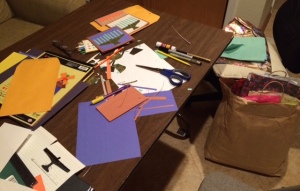Last weekend I decided that I wanted to send some family members Hanukkah cards. In recent years my son has made lovely, creative ones, but this year that was not an option as he was busy with a baseball tournament. (I realize the winter holiday card/baseball tournament conflict is not really a problem in many parts of the world.)
I had not bought greeting cards for a long while, and, looking around at various stores, I was surprised to learn that they now cost $3-4 each. That seemed like quite a lot when I could make them myself, so I decided I would do just that.
The ideas started coming to me. I formed a vision I really liked. It got even better when I looked at the materials I had. But I began to worry that it would not be a quick task. I started thinking that maybe $3-4 was not so much for a greeting card. However, I very much wanted to send timely thoughtful greetings to our family, and the stores were closed, so I continued with my plan.
Once I got into the project, I enjoyed it so much. I was delighted with the results. I knew which card was right for each recipient.
When I was done, I stepped back and this is what I saw:
What a balagan! (The Yiddish word for a “chaotic mess,” which I picked up from my mother-in-law.)
I had wanted to make those cards, then I hesitated, then I did it anyway and enjoyed the process. I made a mess while creating a neat result. I looked at it all and thought, “That is what creativity looks like.”







These are beautiful Karin!
Thanks, Stephen! I sure esteem your artistry, so I love that they struck you that way. Very nice to cross paths with you here in cyberland, too.
They really very attractive cards. I’m sure they will be loved.
Thanks so much, Patricia! They were made with love, so that seems fitting.
We were the happy recipients of one of the beautiful cards. Thank you.
I am not sure if “balagan” is a yiddish word or an Arabic word or perhaps an invented word.
I will have to find out.
Love
Yael
You are most welcome! Thank you for coming by here to tell me.
I’d always assumed “balagan” was Yiddish and verified that in my Yiddish-English dictionary before posting here, but your question made me want to look further. It turns out that it is also considered part of modern Hebrew and that it has equivalents and related words in Russian, Polish, Turkish, and perhaps some other languages as well.
Nice essay on taking creativity and cheerful snail-mail good wishes into your own hands! I was happy to be a recipient. 🙂
Thank you! I used to do more collage cards before I became a mom. I think this was a good reminder to do more. Thank you for being part of the inspiration.